This advisory discusses the immigration consequences of a conviction for a controlled substance offense under California Prop 36, specifically Cal. H&S Code § 11395. This advisory explains the immigration consequences of a criminal plea to a Prop 36 controlled substance offense. It outlines criminal defense strategies for defenders to avoid these pleas and outlines removal defense strategies for immigration practitioners where the plea cannot be avoided.
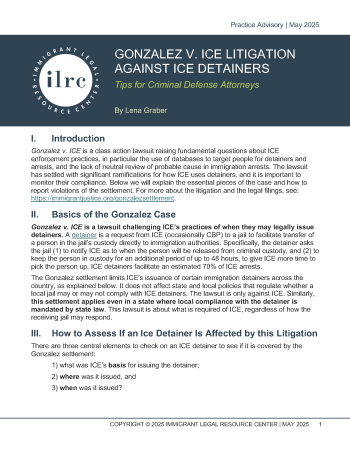
Step by step explanation for criminal defense counsel of how to identify ICE detainers that may be issued in violation of the Gonzalez v. ICE class action. This class action settlement applies nation-wide to limit ICE’s issuance of detainers. This advisory walks through the basics of the case and how to monitor and respond to any violations of the settlement.
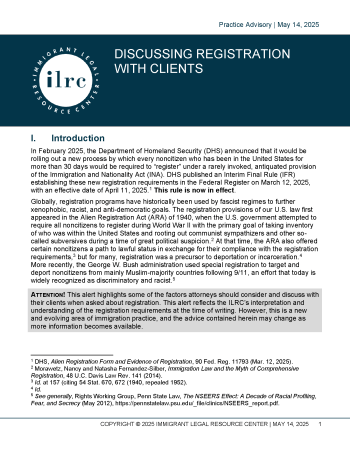
On April 11, 2025, the new Form G-325R took effect as a general tool to register all previously unregistered noncitizens under an antiquated and rarely invoked provision of the Immigration & Nationality Act, with criminal penalties for willful failure to register. This advisory was written to assist attorneys in discussing registration and the new Form G-325R with clients, including screening for prior registration and assessing the potential consequences of registering or not registering, so that individuals can make informed decisions about how to proceed in light of this new rule.
The Trafficking Victims Protection Reauthorization Act of 2008 confers initial jurisdiction over asylum claims filed by unaccompanied children (UCs) to the asylum office. The Board of Immigration Appeals’ decision in Matter of M-A-C-O-, along with policy changes implemented during the first Trump administration, sought to strip away this crucial protection from many child asylum seekers. Because of these changes and legal challenges by immigrant youth advocates, the current landscape of initial UC asylum jurisdiction has changed. This practice advisory provides an overview of the current state of UC asylum jurisdiction following the Matter of M-A-C-O- decision and the outcome of the JOP v. DHS litigation. It also offers some arguments and practical tips to help practitioners advocate for their UC clients to receive the statutory protections afforded by the TVPRA, as well as the benefits from the JOP v. DHS litigation.
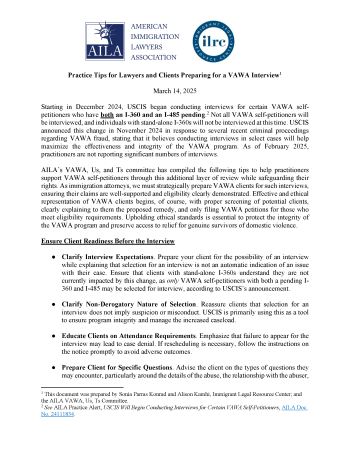
Starting in December 2024, USCIS began conducting interviews for certain VAWA self-petitioners who have both an I-360 and an I-485 pending. ILRC and AILA’s VAWA, Us, and Ts committee compiled tips to help practitioners support VAWA self-petitioners through this additional layer of review while safeguarding their rights.
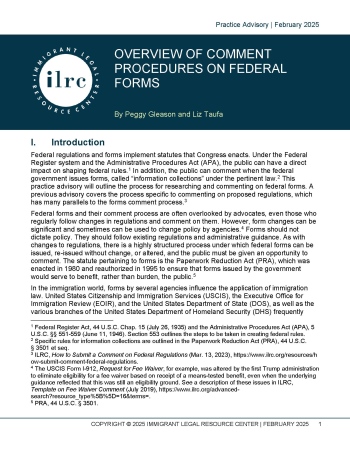
This practice advisory outlines the process for researching and commenting on federal forms. A previous advisory covers the process specific to commenting on regulations, which has many parallels to the forms comment process. Federal forms and their comment process are often overlooked by advocates, even those who regularly follow changes in regulations and comment on them. However, form changes can be significant and sometimes can be used to change policy by agencies. The statute regulating forms is the Paperwork Reduction Act (PRA).
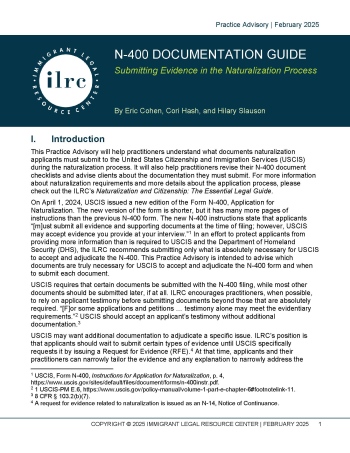
In 2024, USCIS issued a new Form N-400, Application for Naturalization, with more lengthy and complicated instructions on evidence that could be included. This guide will help practitioners understand what documents naturalization applicants must submit to the USCIS to accept and adjudicate the N-400 form and when to submit each document.
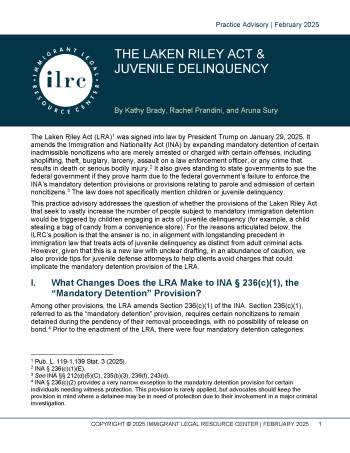
The Laken Riley Act (LRA) was signed into law by President Trump on January 29, 2025. It amends the Immigration and Nationality Act (INA) by expanding mandatory detention of certain inadmissible noncitizens who are merely arrested or charged with certain offenses. This practice advisory addresses the question of whether the provisions of the LRA that seek to vastly increase the number of people subject to mandatory immigration detention would be triggered by children engaging in acts of juvenile delinquency. In the advisory, we argue that the answer is no, in alignment with longstanding precedent in immigration law that treats acts of juvenile delinquency as distinct from adult criminal acts. However, given that this is a new law with unclear drafting, we also provide tips for juvenile defense attorneys to help clients avoid charges that could implicate the mandatory detention provision of the LRA.
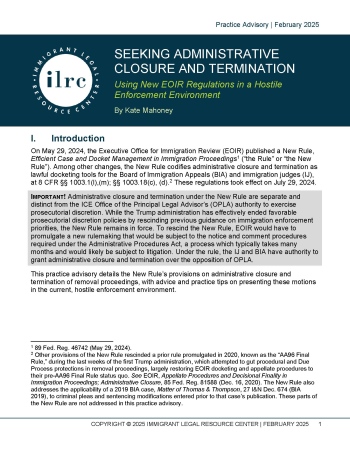
New EOIR regulations published in 2024 now allow immigration judges and the BIA to administratively close or terminate removal proceedings in a variety of scenarios. These regulations permit—and sometimes require—administrative closure or termination even where the Department of Homeland Security does not agree. In the current hostile enforcement environment, and in light of the rescission of formal guidance regarding prosecutorial discretion, these regulations are an important tool for advocates seeking to get clients out of removal proceedings.